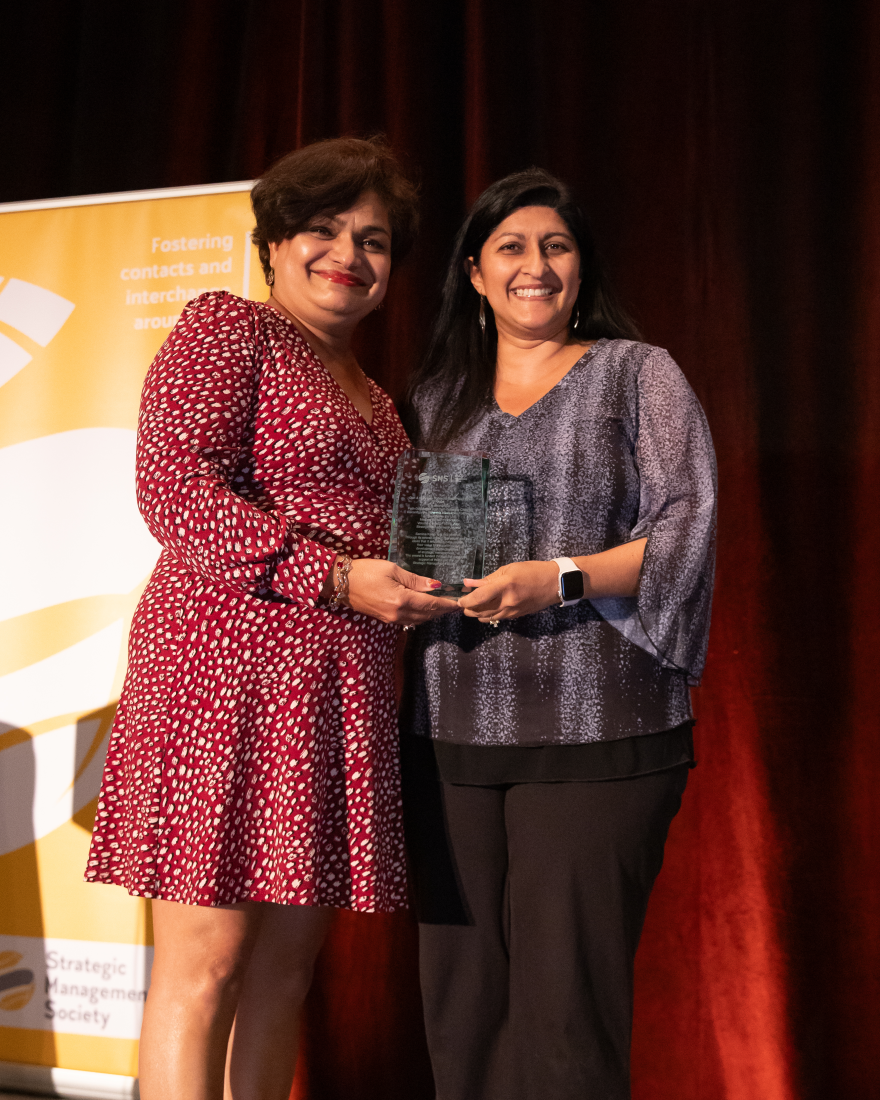When one company buys another company, how do both change in the process? And do these acquisitions lead to innovation or stagnation?
These were the questions Samina Karim — professor at Northeastern University and chair of the Entrepreneurship and Innovation group — grappled with in 2000 when she was a graduate student at the University of Michigan, studying with strategic management professor Will Mitchell, who passed away suddenly in 2021.

Now, the paper that Karim co-wrote with Mitchell as part of her Ph.D. qualifying exams has received The Dan and Mary Lou Schendel Best Paper Prize from the Strategic Management Society for its “significant influence on teaching, research, and/or practice.”
Only papers “published five or more years prior” in the Strategic Management Journal are eligible for the award, the society notes on its website. That Karim’s paper won came as a “complete surprise,” she wrote in a follow-up email.
“The nominations are not announced publicly,” she continued, but determined by the Strategic Management Journal’s editorial board and co-editors.
The paper, titled “Path-Dependent and Path-Breaking Change: Reconfiguring Business Resources Following Acquisitions in the US Medical Sector, 1978-1995,” studied how businesses “reconfigure” around acquisitions.
Reconfiguration is “the idea that firms are proactively making choices of how to change or not to change,” Karim says, “over the course of their life.”
As a company evolves, it faces choices about the “resources and activities” to acquire, remove, recombine, redeploy or retain, she continues.
Karim and Mitchell’s paper focused on how firms reconfigure using an acquiring strategy. They identified three kinds of companies: those making acquisitions, those being acquired and those “that are just continuing,” Karim says, neither purchasing nor being purchased.
Perhaps unsurprisingly, Karim notes, an acquired company gets reconfigured the most — it changes in the wake of being purchased.
But the firms making acquisitions are also “reconfiguring a lot, meaning they’re adding and deleting more than they’re simply retaining,” Karim says.
But “So what?” Karim asks. “So they’re changing a lot. Does that lead to anything good?”
Karim and Mitchell’s paper argues that “acquisition-active” companies are more likely to produce “new-to-the-world innovations,” Karim says, precisely “because [innovative companies are] acquisition active, and they’re getting these new resources from outside.”
“They’re able to recombine resources that their non-acquisition-active counterparts couldn’t do, because the non-acquisition-active firms didn’t get key resources from the external market,” Karim says. “I’ve built my career around this concept of reconfiguration. That’s probably what I’m best known for.”
It’s an honor to receive this award from the Strategic Management Society, Karim says, because it is one of the most prestigious research awards granted in her field.
But it’s also “bittersweet,” Karim says, because of Mitchell’s passing. “This would be even more special if he was here to share it with me,” she says. “He had such a strong role in my life, not just academically, but as a person.”
“He himself went out in the field to work with organizations and NGOs in Africa and Asia,” Karim says, “to try to apply the management principles — that he researched and taught — to organizations to help them be effective.”
Asked what she imagines her former mentor and friend might feel about the award, Karim says, “I think he would be more happy for me than care about it himself.”
“He was the most unassuming person, who did not ever seek accolades,” she says. “So, I think his reaction would be, ‘So happy for you, Samina — let’s get back to work.’”
“He was that kind of a person,” she concludes.
Noah Lloyd is a Senior Writer for NGN Research. Email him at n.lloyd@northeastern.edu. Follow him on Twitter at @noahghola.
